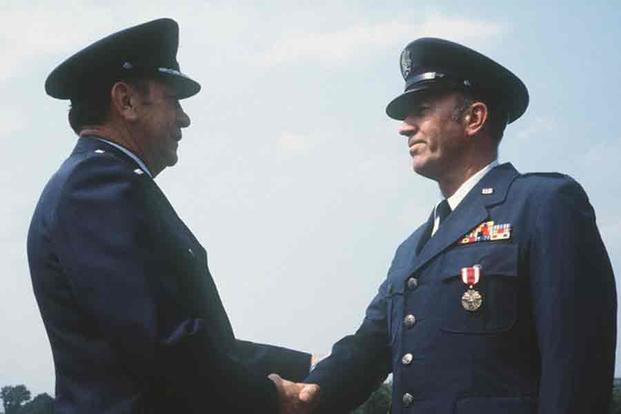
Air Force officials are considering bringing back warrant officers and may start creating a training program this year, reversing a decision from 65 years ago when the service ended that grade, according to a planning document obtained by Military.com.
The three-page planning order says that “great power competition” — Defense Department lingo for escalating defense spending and resources against adversaries such as China — is underscoring the need to resurrect warrant officers, the corps of highly technical service members who are above the enlisted ranks but below the commissioned officer ranks.
“The service must examine new ways to develop and retain a highly capable, technologically capable corps of air-minded warfighters,” the document says. “To fully leverage the technical depth and breadth of talent of our airmen and cultivate the strategic advantage USAF technicians have historically provided, we will make the necessary preparations to re-establish a WO [warrant officer] corps and deliver foundational training for designated WO-1 candidates.”
Read Next: New Tricare Contracts to Kick Off in 2025, Promising Improved Quality and Service for Beneficiaries
The planning order, which originated from Air University and was dated Jan. 26, was marked controlled unclassified information, a term used for unclassified but protected information.
Rose Riley, a Department of the Air Force spokeswoman, declined to comment on the document but noted that next week is the Air and Space Forces Association’s Warfare Symposium in Colorado, a conference where Air Force officials often make policy announcements and speak with members of the press.
“There’s nothing we have to offer on that,” Riley said. “Anything related to the [secretary of the Air Force’s] plans for re-optimizing for great power competition will be announced next week.”
Warrant officers are used by the other service branches as highly technical subject matter experts and single-track leaders. They typically come from the enlisted ranks.
The Air Force had warrant officers when it spun off into a separate service branch in 1947, a role it had inherited from the Army.
According to the Warrant Officer Historical Foundation, the Air Force discontinued the grade in 1959.
“They determined that structure, training and retention needs were best served by eliminating their warrant officer program,” the Warrant Officer Historical Foundation said on its website. “There were approximately 4,500 Air Force warrant officer authorizations when this decision was made.”
The last active-duty Air Force warrant officer was CWO-4 James H. Long, who retired in 1980, according to the foundation.
The last Air Force Reserve warrant officer, CWO-4 Bob Barrow, retired from the ranks in 1992, and was honorarily promoted to CWO-5. He is still the only person in the Air Force ever to hold that grade.
It does not appear, per the document, that the new warrant officer program would be producing pilots.
The Air Force’s January planning document details what it will take “to develop a concept of operations (CONOP) to establish a training pipeline to reintroduce a USAF non-aviation warrant officer (WO) program as a technical corps NLT October 2024.”
The Air Force has previously shot down the idea of using warrant officers as a way to fill the ongoing pilot shortage with aviators. In 2018, Air Force officials said at a conference that the Rand Corp. think tank was tasked with looking at the idea but its study did not recommend it, Military.com reported.
If the training program is successful and occurs, it would be “effectively delivering foundational training for up to 200 junior WO-1s per year and up to 50 senior warrant officers WO-2s — WO-5s with officer’s commissions per year to build and sustain a WO corps.”
Candidates to become warrant officers could come from the active-duty, Air National Guard and reserve, according to the pre-decisional document.
Related: Air Force Again Shoots Down Proposal to Make Warrant Officer Pilots






